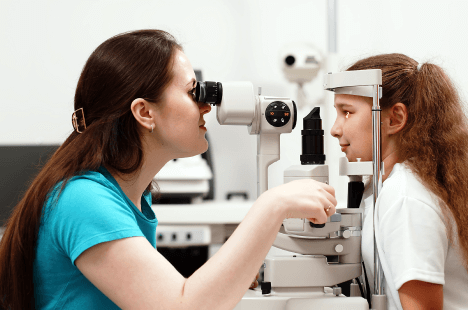
Myopia is the technical term for near-sightedness or short-sightedness. It’s a common condition that usually develops in childhood.
We’re experts in myopia management and can help minimize the impact it has on your or your child’s quality of life.
What is myopia?
Myopia is a refractive error where the eye focuses light in front of the retina instead of directly on it. It means distant objects can appear blurry. Close-up vision is usually unaffected.
People with myopia have either a slightly elongated eye or too much curve on their cornea. It usually develops in children 8-13 years old and progresses.
Children are more likely to develop myopia if their parents have the condition. Environmental factors, such as too much screen time or not enough time spent outdoors, when eyes switch focus from near to far more often, can also come into play.
Myopia symptoms
There are several symptoms of myopia. It’s vital to pay close attention to your children’s behavior as they may not report what they experience as an issue, thinking it to be normal. Signs of myopia in your child’s behavior include:
- difficulty reading the board at school
- sitting too close to the TV
- reluctance to participate in outdoor activities and sports
- complaining of headaches or eye strain
- straining to see objects far away
- eye rubbing
The value of early detection in children
Spotting myopia early can significantly improve the future of your child’s vision and eye health as prompt treatment can slow myopia’s progression, preserving a good quality of vision for as long as possible. It can also mitigate complications associated with high myopia, such as retinal detachment and glaucoma.
From enjoying sports to doing well at school, better vision throughout childhood also equals a better quality of life.
While early treatment involves an upfront cost, it’s much more cost-effective than a lifetime of strong corrective glasses or other complications that might arise from advanced myopia.
How is myopia diagnosed and treated?
We diagnose myopia during a comprehensive eye examination which includes a visual acuity test to measure the quality of vision at different distances.
Specially designed lenses can slow eye growth and limit the elongation of the eye or curve of the cornea. Lenses with different focusing powers can also help.
A wide range of contact lenses and glasses are available that increase the clarity of long-range vision.
There are also lifestyle changes that can support your child’s vision. More time spent outdoors, less screen time, and proper lighting when reading can all help.
Book an appointment
Regular eye tests are the best way to maintain optimal vision and eye health. We encourage you to book a comprehensive eye examination today.

 Myopia Management
Myopia Management Dry Eye Treatment
Dry Eye Treatment Contact Lens Fitting
Contact Lens Fitting Cataract Evaluation
Cataract Evaluation Digital Tonometry
Digital Tonometry


